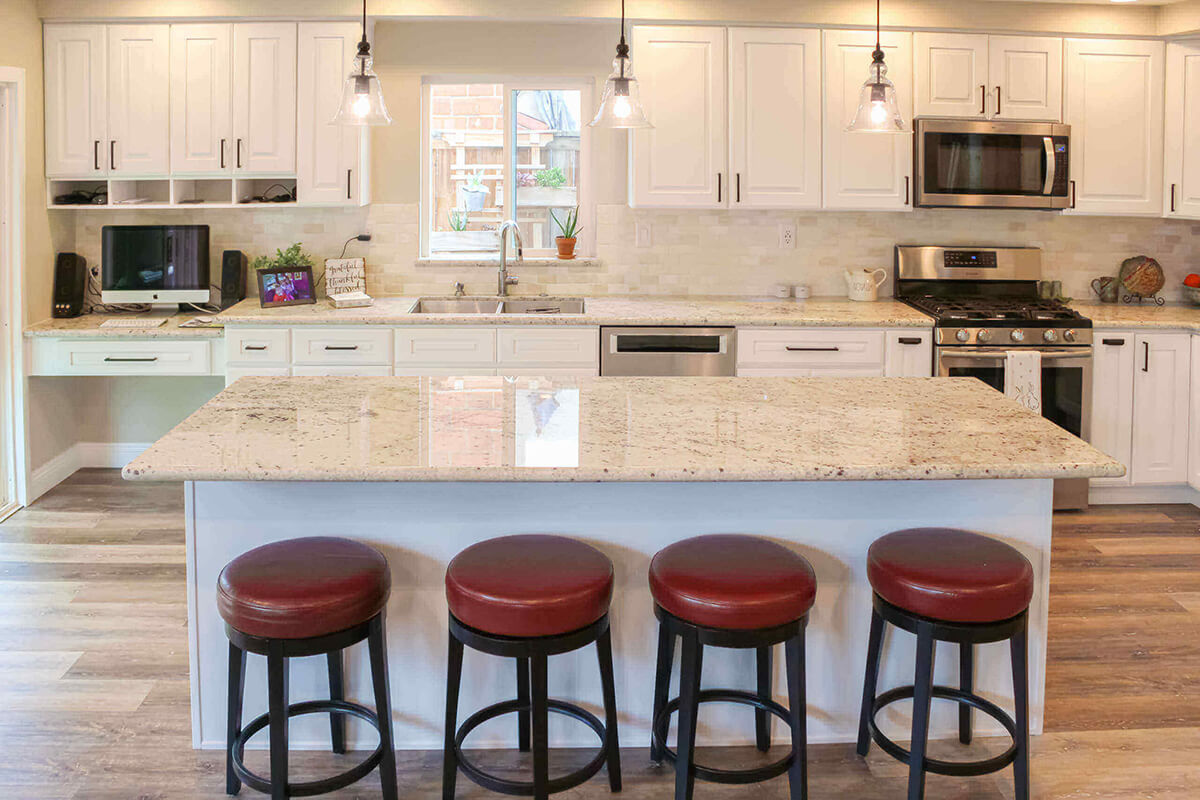Renovating your kitchen can be an exhilarating yet daunting task, especially when it comes to balancing aesthetics with functionality and affordability.
You’ll have a plethora of decisions to make, chief among which is choosing the right kitchen countertop materials. Of course, there are a lot of materials to choose from, which makes it even more difficult to pick one. After all, the material you choose shouldn’t just look great, it should also fit your budget, lifestyle, and culinary needs.
In this post, we’ll explore some of the most cost-effective kitchen countertop materials that don’t skimp on quality or style. Read on for some valuable information on the various materials for kitchen countertops and make informed decisions for your kitchen remodeling project.
1. Laminate Countertops
Laminate countertops have long been favored for their affordability and versatility. Made from layers of plastic bonded to particleboard or kraft paper, these countertops come in an array of designs and finishes. The best part? They look like one of the more expensive materials like natural stone or wood at a fraction of the cost. From classic patterns to modern designs, laminate offers a plethora of options to complement any kitchen decor.
The many advantages of laminate countertops make them an ideal choice for busy kitchens.
- Cost-Effective: Laminate is one of the most affordable kitchen countertop materials available, making it a great choice for budget-conscious homeowners.
- Variety of Designs: It comes in various colors, patterns, and textures, including those that resemble luxurious materials like granite or marble.
- Easy Maintenance: Laminate surfaces are easy to clean and require very little maintenance. Spills can be wiped up easily without leaving stains.
- Durability: Modern laminate countertops are highly durable, and resistant to scratches and other types of wear.
2. Tile Countertops
Ceramic or porcelain tile countertops are another budget-friendly option for homeowners seeking custom kitchen countertops. They’re super sturdy and can withstand high temperatures When choosing tile kitchen countertops, go for larger tiles to minimize grout lines for easier maintenance.
Let’s take a look at a few of their advantages:
- Customization Options: Tile countertops offer endless customization options in terms of colors, sizes, and patterns, allowing for unique designs.
- Heat Resistance: Ceramic and porcelain tiles are heat-resistant, making them ideal for kitchens where hot pots and pans are used.
- Durability: Because they can resist most types of wear and tear, tiles can last for decades with proper care.
- Easily Repairable: Individual tiles can be replaced if damaged, making repairs simpler and less costly than other types of kitchen countertop materials.
3. Butcher Block Countertops
With their natural wood construction, butcher block countertops add a homely touch to the kitchen. These countertops are not only cost-effective, but also offer a durable surface for food preparation. The key to maintaining butcher block’s beauty lies in regular sealing and sanding to prevent water damage and bacteria growth. Further, butcher block countertops are a long-lasting option for those willing to maintain them.
Here’s what you can look forward to if you go for a butcher block countertop.
- Warmth and Character: Wood adds a natural warmth and character to your kitchen that many find inviting and comfortable.
- Functional for Food Preparation: The surface is ideal for food preparation, especially for baking and chopping tasks.
- Renewable: Butcher block countertops can be sanded and resealed, giving them new life and making them a long-lasting choice.
- Eco-Friendly: Wood is a renewable resource, and using it for kitchen countertops can be an eco-conscious choice, especially when sourced sustainably.
4. Concrete Countertops
Concrete countertops offer a unique blend of affordability and customization. This material allows for a wide range of finishes, from polished to matte, and can be tinted to match any color scheme. Concrete is known for its durability and heat resistance. However, it’s important to seal concrete countertops properly to prevent stains and water damage.
Let’s see what you stand to gain from choosing concrete countertops.
- Customizable: Concrete countertops can be customized in shape, color, and finish to fit any kitchen design.
- Resilient: They are incredibly resilient and can handle heavy use without significant damage.
- Heat and Scratch-Resistant: Concrete is naturally resistant to heat and scratches, which is ideal for busy kitchens.
- Unique Aesthetic: Each concrete countertop is unique, with variations in color and texture that add a distinctive look to your kitchen.
5. Solid Surface Countertops
Made from acrylic or polyester, solid surface countertops are yet another option for those who want to save money without compromising quality. These countertops are strong and require minimal maintenance. Solid surface countertops come in a variety of colors and patterns, including options that resemble natural stone. They can also be custom fabricated to fit any kitchen layout, with seamless joins.
Don’t miss out on the following benefits of solid surface countertops:
- Non-Porous: Solid surface materials are non-porous, making them resistant to stains and bacterial growth.
- Flawless Appearance: These countertops can be fabricated with near-invisible seams, giving a clean, sleek look.
- Easily Repairable: Minor scratches and burns can be sanded out, restoring the countertop to its original condition.
- Diverse Range of Colors and Patterns: Solid surface countertops come in an extensive range of colors and patterns. This means you can pick and choose as per your unique taste.
6. Recycled Materials
Here’s an interesting tidbit: Choosing kitchen countertops made from recycled materials not only benefits the environment, but can also be a cost-effective option. Surprised? Don’t be!
Recycled glass and composite materials offer unique and vibrant aesthetics that can set your kitchen apart. These eco-friendly materials provide easy-to-maintain surfaces, contributing to a sustainable kitchen design.
- Eco-Friendly: Countertops made from recycled materials reduce waste and use fewer natural resources, making them environmentally friendly.
- Unique Look: Recycled glass and composite materials can create distinctive and colorful countertops that stand out.
- Durable: Many recycled/eco-friendly materials are extremely durable and resistant to stains, scratches, and heat.
- Low Maintenance: These countertops often require little maintenance beyond regular cleaning.
7. Wood Countertops
Wood countertops are versatile, suitable for both traditional and modern designs, and offer a cost-effective solution. Regular maintenance, including oiling and sealing, will ensure these countertops age gracefully over time. Its advantages include:
- Natural Beauty: Each piece of wood has unique grain patterns and colors, adding natural beauty to your kitchen.
- Warmth: Wood countertops bring a sense of warmth and coziness to a kitchen that other materials cannot match.
- Easily Refinished: Over time, wood can be sanded and refinished to remove any wear and tear, essentially providing a new countertop surface.
- Sustainability: When sustainably sourced, wood countertops can be an environmentally responsible choice.
8. Stainless Steel Countertops
Known for their hygiene and ease of cleaning, stainless steel countertops can withstand high temperatures and heavy use. They’re ideal for those who cook frequently. While they may show fingerprints and scratches, these marks can add character over time, or can be minimized with proper care.
- Hygienic: Stainless steel is non-porous and resists bacteria and germs, making it one of the most hygienic countertop options.
- Heat Resistant: It can withstand high temperatures without damage.
- Robust: Stainless steel is extremely robust and resistant to water, stains, and most chemicals.
- Modern Aesthetic: The smooth and shiny surface of stainless steel adds a contemporary look to any kitchen.
9. Soapstone Countertops
Soapstone is a natural stone that offers a soft, matte finish and a distinctive, warm touch. It’s durable, non-porous, and resistant to heat, making it a practical choice for kitchens. Soapstone countertops develop a natural patina over time, enhancing their beauty. Regular application of mineral oil can help to maintain their appearance and enhance their natural veining.
- Natural Beauty: Soapstone has a rich, deep color and smooth texture that adds an elegant, natural look to any kitchen.
- Chemical and Heat Resistant: Naturally resistant to chemicals and heat, soapstone countertops are a practical choice for a kitchen surface.
- Non-Porous: Soapstone is non-porous, so it doesn’t require sealing. It is resistant to bacteria and staining.
- Aging Quality: Soapstone develops a natural patina over time, which enhances its character and beauty with age.
Conclusion
When it comes to kitchen remodeling, the choice of countertop material plays a crucial role in the project’s overall success. So, what is the best material for kitchen countertops? There’s no “one-size-fits-all” answer to this. From laminate countertops to soapstone, there are affordable options available that don’t compromise on quality or style. Before deciding, it’s important to consider not only the initial cost but also the longevity, maintenance tips, and how the countertops will fit into your daily life.
At OMG Kitchens, we believe that with the right information and careful planning, you can select the best kitchen countertop materials for your remodeling project. We’ll help you strike a balance between cost, functionality, and aesthetic appeal. Call us at 948-540-8859 today to schedule an appointment with us.





